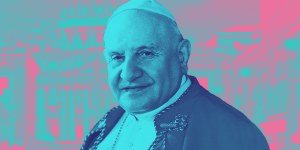One of the fundamental rights of all human beings is the right to worship God in freedom, neither coerced nor persecuted for their beliefs.
St. John XXIII firmly believed in this right, and wrote about it in his encyclical Pacem in Terris.
[A]mong man's rights is that of being able to worship God in accordance with the right dictates of his own conscience, and to profess his religion both in private and in public. According to the clear teaching of Lactantius, "this is the very condition of our birth, that we render to the God who made us that just homage which is His due; that we acknowledge Him alone as God, and follow Him. It is from this ligature of piety, which binds us and joins us to God, that religion derives its name.''
This right does not only apply to Christians, but all humans of goodwill who seek to serve the dictates of their religion.
The Catholic Church has been a firm supporter of religious freedom over the years, as St. John XXIII explains.
Hence, too, Pope Leo XIII declared that "true freedom, freedom worthy of the sons of God, is that freedom which most truly safeguards the dignity of the human person. It is stronger than any violence or injustice. Such is the freedom which has always been desired by the Church, and which she holds most dear. It is the sort of freedom which the Apostles resolutely claimed for themselves. The apologists defended it in their writings; thousands of martyrs consecrated it with their blood."
True and lasting peace on earth must include this fundamental right to religious freedom.



